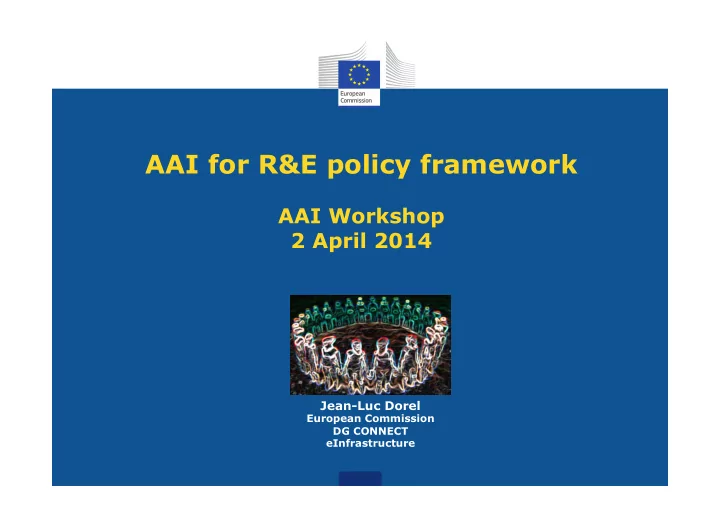

AAI for R&E policy framework AAI Workshop 2 April 2014 Jean-Luc Dorel European Commission DG CONNECT eInfrastructure
Policy context
A variety of efforts • EUDAT • EGI • STORK • National R&E Federation • ODIN • Global dimension & • FIM4R standards Common understanding of: • REFEDS Roles, interfaces, requirements, challenges • GÉANT NA3/T4 • RDA • GÉANT open call • LIBER • - CLASSe • - GÉANT-Trustbroker • GÉANT JRA3 • GÉANT SA5 • - HEXAA • - attributes and groups • - eduGAIN • - WoT4LoA • - identity & trust technologies • - federation as a service • - enabling users
Report: Advancing Technologies and Federating Communities -> On-going -> On-going (eduroam) -> On-going (Moonshot) -> WP14 -> WP14 -> WP14 -> WP14 -> WP14 -> on-going (attributes and groups) -> on-going
Report: Advancing Technologies and Federating Communities -> On-going -> WP14 -> WP14 -> WP14 -> On-going -> WP14
Report: Advancing Technologies and Federating Communities -> On-going -> WP14 -> WP14 -> On-going -> WP14
Core services Specific challenge Support to harmonise and/or deploy core e- infrastructure services is crucial for their effective use by both production e- infrastructures and e-infrastructures under development. Core services are considered those that 1) enable e-infrastructure interoperation and 2) are common across a broad range of e-infrastructures and research communities.
Core services: scope Deployment and promotion of a pan-European identity federation for researchers, educators and students, in compliance with existing identity inter-federation efforts (including Eduroam and Edugain). The action will involve (research and education) institutions in EU Member States, existing identity federations, e- infrastructure providers and libraries. It should aim to overcome technical, organisational and legal obstacles for the implementation of an integrated and interoperable authentication and authorisation infrastructure (AAI) and to lower barriers for entry of organisations not already participating in identity federations, e.g. by providing scalable policy negotiation mechanisms, as well as legal guidance notably in data protection.
Core services: scope It should also encourage the use of security token translation services to enable interoperability of different AAIs, as well as accounting services for enabling interoperability and aggregation in recording the usage of resources securely and reliably, including for the highly distributed heterogeneous infrastructures envisaged for global research data. Guest identities and alternative methods of identification (e.g. social media identities) are encouraged e.g. in order to allow public access at large. Assessment of penetration of existing identity federations at national level and development of training activities for data professionals on issues related to AAI enabled collaboration and data sharing (data privacy, intellectual property, cultural barriers, etc.) should be foreseen.
Core services Expected Impact Improved interoperability of e-infrastructure services and • easier resource access and collaboration between scientists. Reduced duplication of efforts for common services. • New prospects for advanced services for science and • education, more openness and trust with DIIs European-wide single sign-on service enabling researchers • to collaborate within secure and trusted virtual research environments where scientific resources and content can be accessed, used, stored and shared. Increased sharing of information resources at European • level. Expansive coverage of national identity federations for • network, services and applications. Easier participation in identity federations
Core services Conditions Type of action: Research and Innovation Actions • Call: Call 3 • Deadline for the submission of proposals: • 02/09/2014 Overall budget: 6 M € •
Expectation for the Workshop: • Facilitate communication among different groups (IdP, CP, IdP+CP, users, federations, inter-federation…) • Exposure to colleagues in the EC • Coordination among different efforts • Stakeholders consultation for WP16-17 Common understanding of: Roles, interfaces, requirements, challenges
Agenda 10:30: start • Introduction by the EC on the aim of the workshop - Carlos Morais-Pires (EC - DG Connect) • Review of the AAA study: what has happened since and what not and why - Opportunities to work on some of the recommendations in the Horizon2020 calls? Jean-Luc Dorel (EC - DG Connect) • Setting the AAI Scene - Federated access (how it works, IdPs and SPs) standardisation and international collaboration - Licia Florio (TERENA) 11:10 - 11:30 BREAK • Setting the AAI Scene - Overview on STORK (Vicente Andreu, Universitat Jaume I), EUDAT (Daan Broeder, CLARIN), EGI (Gergerly Sipos, EGI) - Successful inter-federation showcases and the use-cases they support (OpenConext, eduGAIN) - Niels van Dijk (SURFnet) and Brook Schofield (TERENA) 13:00 - 14:00 LUNCH • e-Researchers requirements: - DARIAH - Peter Gietz - EuGridPMA - David Groep - DASISH/CLARIN - Daan Broeder - ELIXIR - Mikael Linden - ESA - Andrea Baldi 15:00 - 15:15 BREAK (audience splits into groups while they grab a coffee) Roundtable discussion on the following topics: - drivers & barriers for a cross-sector European federated AAI - AAI user requirements and future use-cases to be supported by an AAI infrastructure Closing remarks by the European Commission
THANK YOU ¡ jean-luc.dorel@ec.europa.eu European Commission – DG CNECT eInfrastructures
Recommend
More recommend